“We took some time to settle into our new rhythm before sharing this sweet news.”
If you love a good comeback story, then you’ll love what L boy names have in store for you.
The letter “L” was a top-10 first initial for boys every year between 1880 and 1956 before suffering its big downfall — falling as far back as 16th in the late-1970s and 1980s, according to Behind the Name.
But that downfall was never going to last too long.
The letter “L” re-entered the top-10 in 2005 and has now been a top-5 first initial for boys every year since 2013 — most recently ranking 4th in 2023 after several years at No. 3.
And we have several L boy names to thank for this recent rise in popularity.
In fact, we saw 11 boy names that start with L crack the U.S. Social Security Administration’s (SSA) list of the top-100 most popular boy names of 2023.
Liam, of course, ranked No. 1 on that list after being given to more than 20,000 baby boys in 2023, alone.
Lucas (9th), Levi (12th), Leo (18th), Luca (24th), Luke (31st), Logan (39th), Lincoln (64th), Leonardo (84th), Luka (95th) and Landon (97th) were the only other L boy names to crack the top 100.
That’s quite impressive considering there are only five L names for boys listed in the SSA’s most popular boy names over the past century — which includes data from 1924 to 2023.
Those five names included Larry (37th), Lawrence (78th), Logan (82nd), Liam (94th) and Lucas (100th).
Since boy names starting with L are in high demand today, let’s take a look at some of the more unique L boy names that are emerging in the United States — and where those L boy names come from.
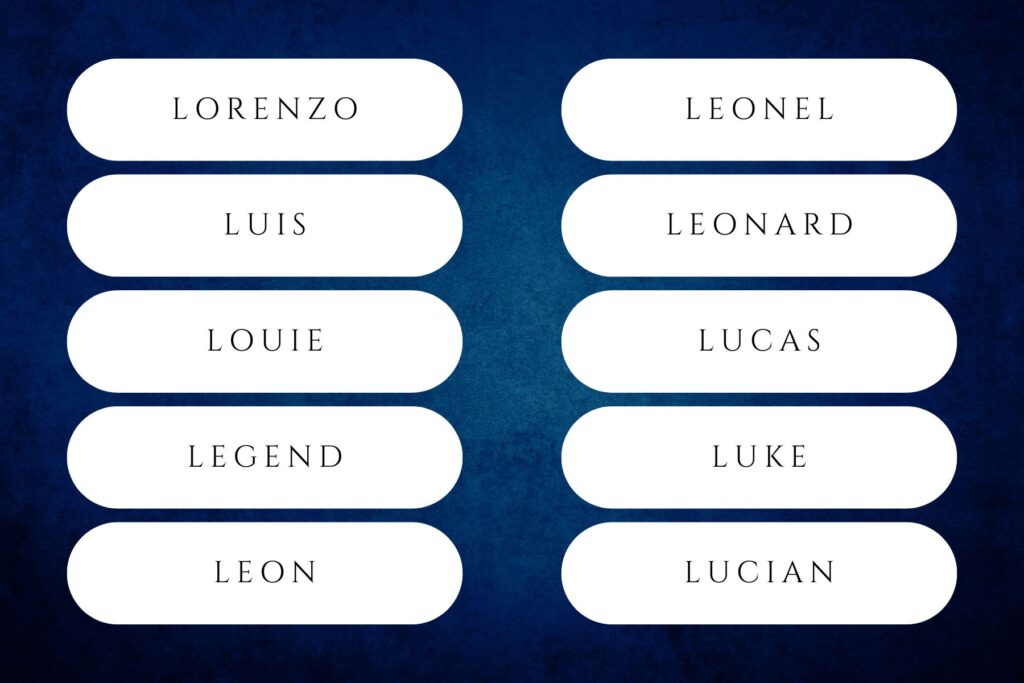
Lorenzo
Origin: Roman; Latin
Meaning: From Laurentum; City of laurels
Lorenzo, pronounced lo-REN-zoh, is the Italian and Spanish form of Laurentius, which is derived from the ancient Roman city Laurentum. The city was likely named after the Latin word laurus, meaning “laurel.”
RELATED: 50+ Dynamic Boy Names Starting With D for Your Future Son
Luis
Origin: Spanish; Latin; Germanic
Meaning: Famous warrior
Luis, pronounced loo-EES or LOO-is or LOO-ee, is the Spanish form of Louis, derived from the Latin name Ludovicus and Germanic name Ludwig, which is composed of the Germanic elements hlut, meaning "famous," and wig, meaning "battle.”
Louie
Origin: French; Latin; Germanic
Meaning: Famous warrior
Louie, pronounced LOO-ee, is a diminutive form of Louis or Lewis. The name shares the same Germanic roots as its parent names, which are derived from Ludwig and composed of the Germanic elements hlut, meaning "famous," and wig, meaning "war.”
Legend
Origin: English; Latin
Meaning: Storyteller; Famous person; To read
Legend, pronounced LEDGE-ind, comes directly from the English word legend, referring to a traditional story or extremely famous or notorious person. The word legend ultimately derives from the Latin word legere, meaning “to read.”
Leon
Origin: Greek
Meaning: Lion
Leon, pronounced LEE-on, comes directly from the Greek word leon, meaning “lion.” It’s commonly used as a diminutive of names like Leonel, Leonardo or Leonidas, but can also be shortened itself to just Leo.
Leonel
Origin: Spanish; Greek; Hebrew
Meaning: Lion of God; God’s lion
Leonel, pronounced lay-oh-NEL, is a variant of Leon used primarily in Spanish and Portuguese-speaking countries. It derives from the Greek word leon, meaning “lion,” but you can give the name extra meaning by linking the suffix to the Hebrew element el, meaning “God.”
Leonard
Origin: Germanic
Meaning: Brave lion; Brave like a lion
Leonard, pronounced LEN-erd, derives from the Germanic elements lewo, meaning “lion,” and hart, meaning “brave.” Common nicknames for a boy named Leonard include Len, Lenny, Leon and Leo.
Lucas
Origin: Greek; Latin
Meaning: From Lucania; From the light
Lucas, pronounced LOO-kiss or LOO-kus, comes from the Greek names Loukas and Loukanos, meaning “from Lucania.” Lucania, likely derived from the Latin word lux, meaning “light,” is an ancient region in southern Italy.
Luke
Origin: English; Greek; Latin
Meaning: From Lucania; From the light
Luka, pronounced LEWK, is the English form of the Latin name Lucas, which derives from the Greek name Loukas, meaning “from Lucania,” and is likely inspired by the Latin word lux, meaning “light.”
Lucian
Origin: Roman; Latin
Meaning: Light
Lucian, pronounced LOO-shin or loo-see-EN, is the Anglicized form of the Roman family name Lucianus and Roman praenomen Lucius, which is ultimately derived from the Latin word lux, meaning “light.”
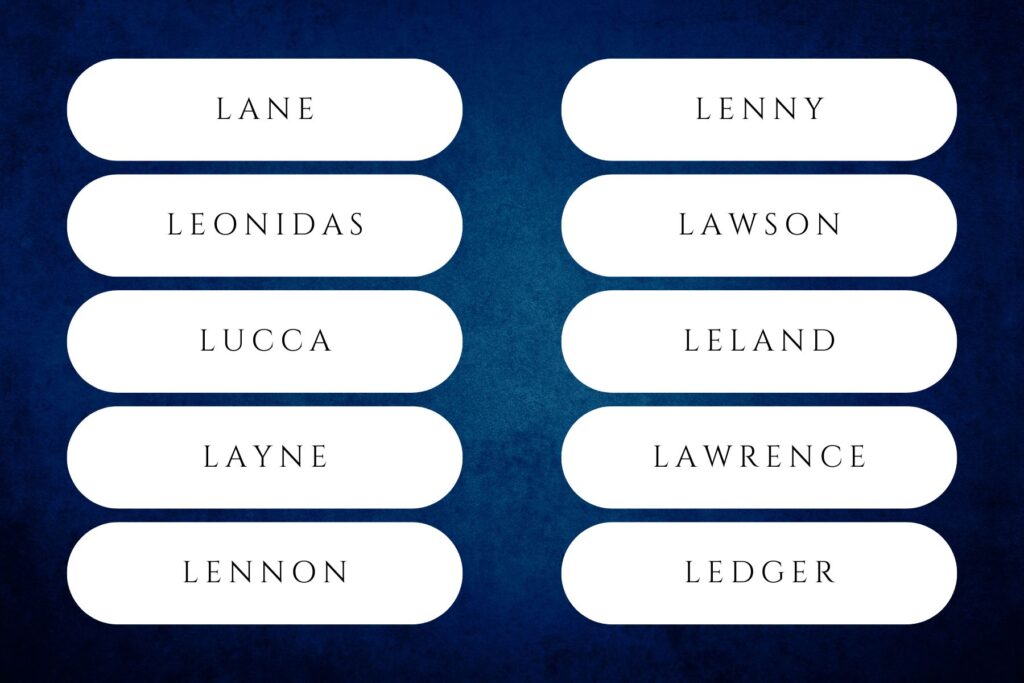
Lane
Origin: Old English
Meaning: Narrow road; Passageway
Lane, pronounced LAYN, comes directly from the English word lane and Old English word lanu, referring to a “narrow hedged-in road.” It was traditionally given to a baby who lived near or was born by a lane.
Leonidas
Origin: Greek
Meaning: Son of Leon; Son of a lion
Leonidas, pronounced lee-oh-NIGH-dus, combines the Greek word leon, meaning “lion,” with the patronymic suffix ides, meaning “son of.” Leonidas I was king of the Ancient Greek city-state of Sparta.
Lucca
Origin: Italian; Latin
Meaning: From Lucca; From the light
Lucca, pronounced LOO-kah, is an Italian variant of Luca and Lucas. It originated as a habitational surname from Lucca Sicula, a village in the Agrigento province in Sicily that was called Lucca until 1863.
Layne
Origin: Old English
Meaning: Narrow road; Passageway
Layne, pronounced LAYN, is a modern variant of Lane, which comes directly from the English word lane and Old English word lanu, referring to a narrow road or passageway. It was often given to someone who lived near or was born by a road.
Lennon
Origin: Irish
Meaning: Lover
Lennon, pronounced LEN-in, is derived from the Irish byname Leannán, meaning “lover.” The name gained worldwide recognition through musician and former “The Beatles” member John Lennon.
Lenny
Origin: Roman; Latin; Irish
Meaning: Lion; Brave lion; Lover
Lenny, pronounced LEN-ee, is commonly used as a diminutive of names like Leonard, meaning “brave lion,” Lennon, meaning “lover,” and Leonel, meaning “lion.” Other variants include Len, Lennie and Leni.
Lawson
Origin: English; Roman; Latin
Meaning: Son of Lawrence; Laurel
Lawson, pronounced LAW-sin, originated as an English patronymic surname meaning "son of Lawrence." The name Lawrence comes from the Roman name Laurentius, meaning “from Laurentum,” referring to the ancient Italian city. Some theories suggest it comes from the Latin word laurus, meaning “laurel.”
Leland
Origin: Old English
Meaning: Fallow land
Leland, pronounced LEE-lind, comes from an Old English surname meaning “fallow land,” which refers to an arable land that is intentionally left unplanted for one or more growing seasons to allow the soil to recover.
Lawrence
Origin: Roman; Latin
Meaning: From Laurentum; Laurel
Lawrence, pronounced LOR-ints or LOR-ents, is a variant of Laurence, which comes from the Roman name Laurentius, meaning “from Laurentum,” an ancient city in Italy. It’s likely derived from the Latin word laurus, meaning “laurel.”
Ledger
Origin: Old German; English
Meaning: Spear tribe; Record-keeper
Ledger, pronounced LEH-jur, comes from the Old German name Leutgar, which is composed of the Old German elements liut, meaning “people,” and ger, meaning “spear.” It also comes directly from the English word ledger, referring to a record-keeping system used in accounting.
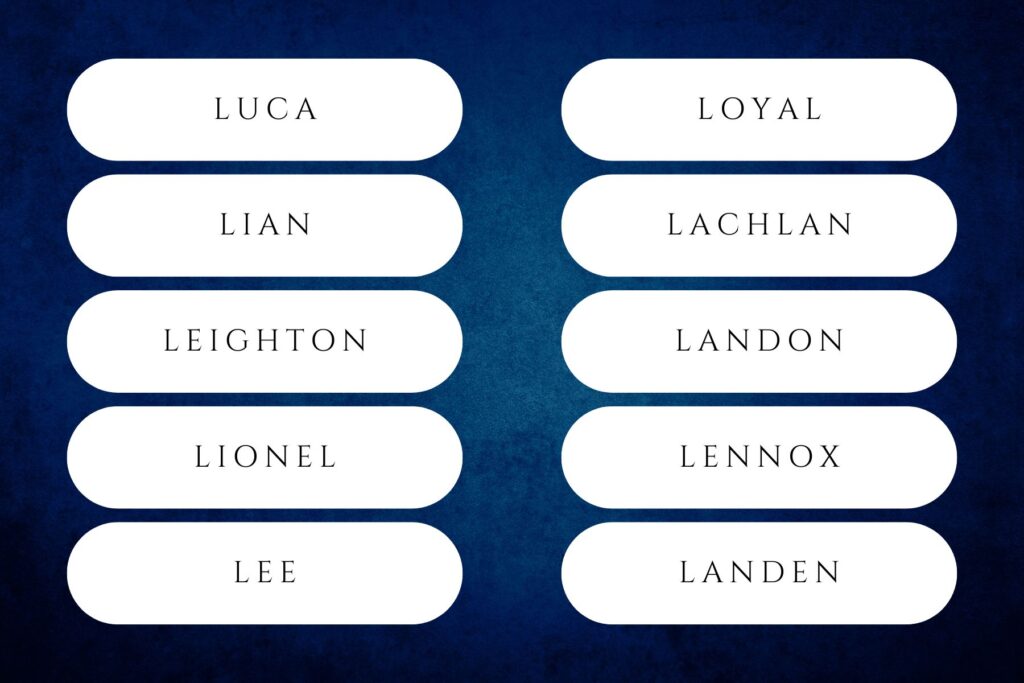
Luca
Origin: Italian; Greek; Latin
Meaning: From Lucania; From the light
Luca, pronounced LOO-kuh, is the Italian and Romanian form of Lucas, which comes from the Greek name Loukas, meaning “from Lucania,” and is ultimately derived from the Latin word lux, meaning “light.”
Lian
Origin: Chinese; Hebrew
Meaning: Waterfall; Water Lily; Lotus; Graceful meadow
Lian, pronounced LEE-in or lee-ANN, comes directly from the Chinese word lian, meaning “waterfall,” “lotus” or “water lily.” It can also be a diminutive of Leanna, meaning “graceful meadow,” or a diminutive of names ending in -lian, such as Julian.
Leighton
Origin: Old English
Meaning: Leek garden; Lake settlement
Leighton, pronounced LAY-tin or LAYT-in, is a variant of Layton, which comes from an English place name meaning “leek garden” or “lake settlement.” The spelling was popularized by “Gossip Girl” actress Leighton Meester.
Lionel
Origin: French; Greek; Hebrew
Meaning: Lion of God; God’s lion
Lionel, pronounced LIE-uh-nel, is a French diminutive of Leon and variant spelling of Leonel, which derives from the Greek word leon, meaning “lion.” When combined with the Hebrew element el, meaning “God,” the name Lionel can mean “lion of God.”
Lee
Origin: Old English; Chinese
Meaning: Meadow; Clearing; Plum; Profit
Lee, pronounced LEE, is derived from the Old English element leah, meaning “meadow” or “clearing.” It can also mean “plum” or “profit” in Chinese, depending on the hanzi used, or be a nickname for names starting with Le- or Li-.
Loyal
Origin: English; Latin
Meaning: True; Faithful; Legal; Law
Loyal, pronounced LOY-uhl, comes directly from the English word loyal, meaning “true or faithful in allegiance.” The word loyal ultimately derives from the Latin word legalis, meaning “legal” or “law.”
Lachlan
Origin: Old Irish
Meaning: Land of the lakes
Lachlan, pronounced LOK-lyn, is the Anglicized form of Lochlann, which derives from the Old Irish word loch, meaning “lake.” Lochlann is another name for Scandinavia and often translates to “land of the lakes.”
Landon
Origin: Old English
Meaning: Long hill
Landon, pronounced LAN-dun or LAN-dyn, derived from an Old English place name combining elements meaning "long" and "hill." It sounds eerily similar to London, the capital of England and the United Kingdom.
Lennox
Origin: Scottish; Irish
Meaning: Place of elms; Lover; Round hill
Lennox, pronounced LEN-iks, is derived from the name of a region of Scotland centred on The Vale of Leven. The region, called Leamhnachd, means “place of elms.” It can also be a modern combination of Lennon, meaning “lover,” and Knox, meaning “round hill.”
Landen
Origin: Old English
Meaning: Long hill
Landen, pronounced LAN-dyn, is a variant of Landon, which comes from an Old English place name meaning “long hill.” Landen isn’t as common as Landon, but it is more popular than Landyn.
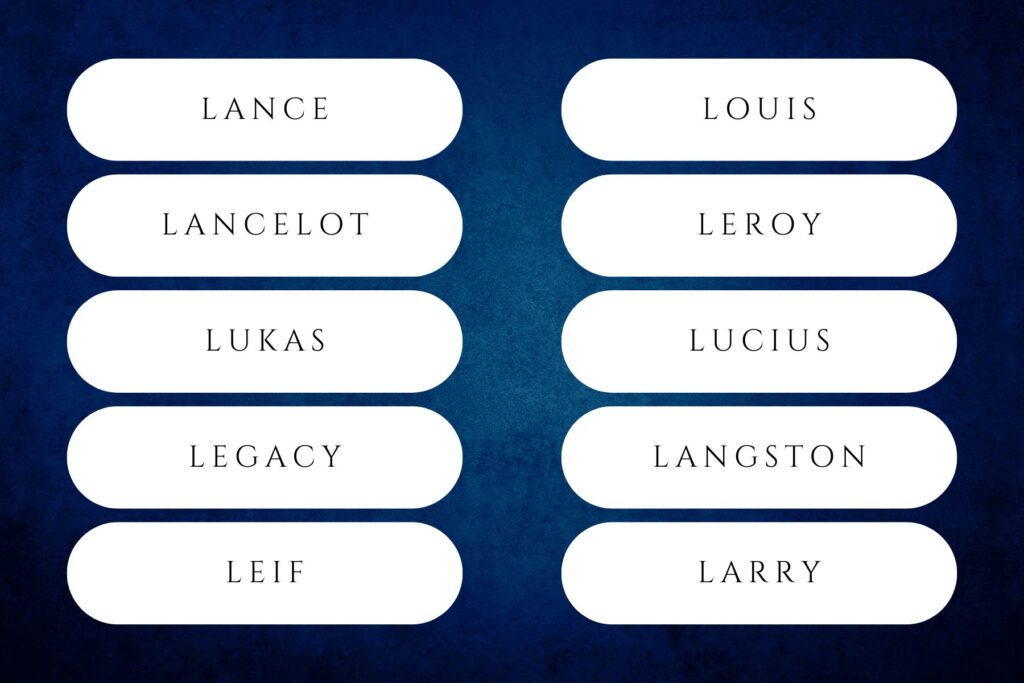
Lance
Origin: Old French; Old High German
Meaning: Spear; Land
Lance, pronounced LANTS, comes directly from the Old French word lance, meaning “spear.” Other theories suggest that it comes from the Germanic name Lanzo and Old High German element lant, meaning “land.”
Lancelot
Origin: Old French; Old High German
Meaning: Spear; Land
Lancelot, pronounced LANTS-uh-lot, is believed to be an elaboration of the name Lance, which either means “spear” in French or “land” in German. In Arthurian legend, Sir Lancelot was the greatest knight of the Round Table.
Lukas
Origin: Greek; Latin
Meaning: From Lucania; From the light
Lukas, pronounced LOO-kiss or LOO-kus, is a variant of Lucas, which comes from the Greek name Loukanos, meaning “from Lucania,” and is ultimately derived from the Latin word lux, meaning “light.”
Legacy
Origin: English; Latin
Meaning: Bequest; Inheritance
Legacy, pronounced LEH-guh-see, comes directly from the English word legacy, meaning “something inherited from a predecessor,” which is ultimately derived from the Latin word legatum, meaning “bequest.”
Leif
Origin: Old Norse
Meaning: Descendent; Heir
Leif, pronounced LAYF or LEEF, comes from the Old Norse name Leifr, meaning “descendent” or “heir.” The name gained historical significance through Leif Erikson, a Norse explorer who allegedly reached North America centuries before Christopher Columbus.
Louis
Origin: French; Latin; Germanic
Meaning: Famous warrior
Louis, pronounced loo-EES or LOO-is or LOO-ee, is the French form of Ludovicus, which comes from the Germanic name Ludwig, ultimately composed of the Germanic elements hlut, meaning "famous," and wig, meaning "war.”
Leroy
Origin: English; French
Meaning: The king
Leroy, pronounced LEE-roy, derives from the French phrase le roi, meaning “the king.” It was traditionally used as a surname in medieval France and was particularly used by those connected to royalty or nobility.
Lucius
Origin: Roman; Latin
Meaning: Light
Lucius, pronounced LOO-shus or loo-SEE-us, is derived from the Latin word lux, meaning “light.” It was one of the most common praenomens (given names) in ancient Rome, often given to boys born at dawn.
Langston
Origin: Old English
Meaning: Long stone
Langston, pronounced LANG-stuhn or LANG-styn, comes from an English place name composed of the Old English elements lang, meaning “long,” and stan, meaning “stone.” It was popularized by poet Langston Hughes.
Larry
Origin: English; Roman; Latin
Meaning: From Laurentum; Laurel
Larry, pronounced LAIR-ee, is a common nickname for Lawrence or Laurence, which comes from the Roman name Laurentius, meaning “from Laurentum,” an ancient city in Italy. It’s likely derived from the Latin word laurus, meaning “laurel.”
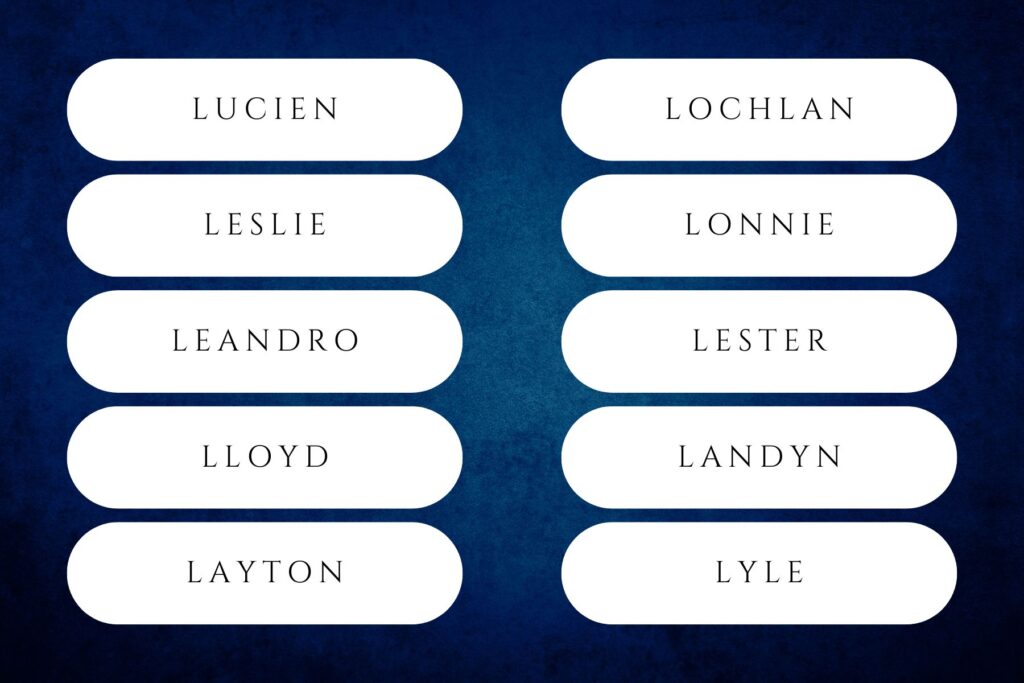
Lucien
Origin: French; Roman; Latin
Meaning: Light
Lucien, pronounced loo-see-EN, is the French form of the Roman family name Lucianus, which comes from the Roman given name Lucius and is ultimately derived from the Latin word lux, meaning “light.”
Leslie
Origin: Scottish; Gaelic
Meaning: Garden of holly
Leslie, pronounced LEZ-lee, derives from a Scottish place name in Aberdeenshire, which is believed to be named after the Gaelic phrase leas celyn, meaning “garden of holly,” referring to the small evergreen plant.
Leandro
Origin: Spanish; Italian; Greek
Meaning: Lion man; Lion-like
Leandro, pronounced le-AHN-dro, is the Spanish, Portuguese and Italian form of Leander, which comes from the Greek name Leandros and is composed of the Greek elements leon, meaning “lion,” and aner, meaning “man.”
Lloyd
Origin: Welsh
Meaning: Grey; Brown
Lloyd, pronounced LOYD, comes from the Welsh element llwyd, meaning “grey” or “grey-haired.” In Welsh culture, llwyd was used to describe various shades of gray, including shades of brown.
Layton
Origin: Old English
Meaning: Leek garden; Lake settlement
Layton, pronounced LAY-tin or LAYT-in, developed from an English place name derived from Old English elements meaning either "leek garden" or "lake settlement." It was popularized alongside similar names like Payton and Dayton.
Lochlan
Origin: Old Irish
Meaning: Land of the lakes
Lochlan, pronounced LOK-lyn, is a variant of Lachlan, which comes from the Old Irish word loch, meaning “lake.” Lochlann is another name for Scandinavia in Old Irish and often translates to “land of the lakes.”
Lonnie
Origin: English; Gothic
Meaning: Noble and ready
Lonnie, pronounced LON-ee, is a common diminutive of Alonzo, which derived from the Latin name Alphonsus and is composed of the Gothic elements aþals, meaning “noble,” and funs, meaning “ready.” meaning “noble and ready.”
Lester
Origin: Old English; Latin
Meaning: From Leicester; River camp; Camp by the river
Lester, pronounced LEH-stir, was derived from the English place name Leicester, itself a combination of Ligore, the name of a people living by the River Soar, and the Latin word castra, meaning “camp.”
Landyn
Origin: Old English
Meaning: Long hill
Landyn, pronounced LAN-dyn, is a variant of Landon, which comes from an Old English place name meaning “long hill.” This is the least common variant of Landon and has only been relevant for 20 years.
Lyle
Origin: Old French; English
Meaning: The island
Lyle, pronounced LYLE, derives from the Old French phrase l’isle, meaning “the island.” It originated as a location surname for someone who lived on or near an island. It can also be a modern variant of Kyle.
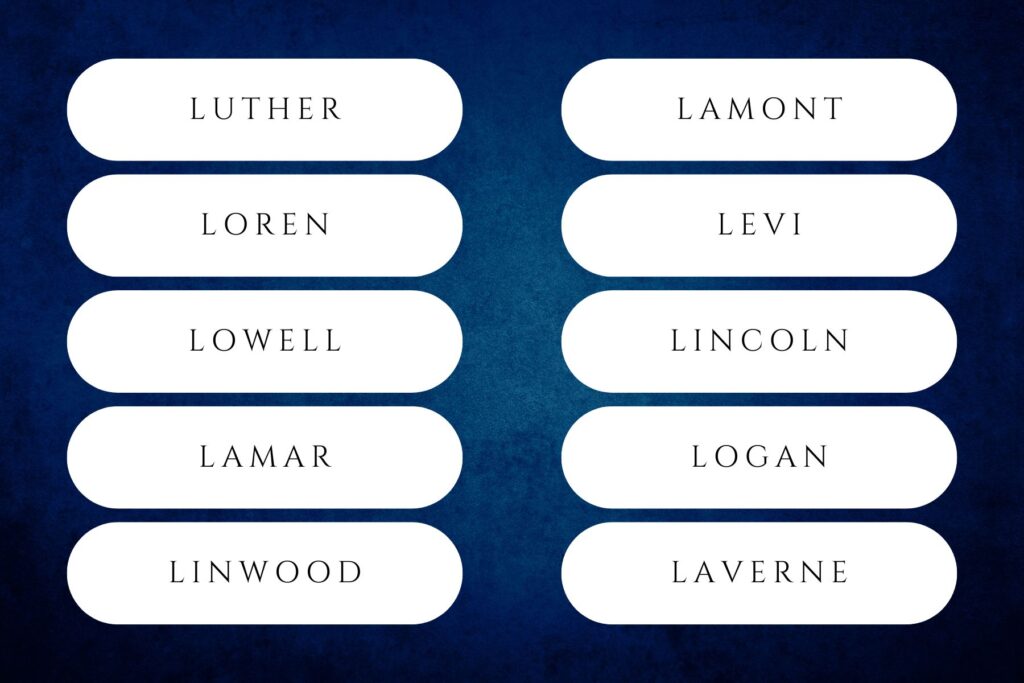
Luther
Origin: Old German
Meaning: Army of the people
Luther, pronounced LOO-ther, comes from the Old German name Leuthar, which is composed of the Old German elements liut, meaning “people,” and heri, meaning “army.” Therefore, it means “army of the people.”
Loren
Origin: Roman; Latin; English
Meaning: From Laurentum; Laurel
Loren, pronounced LOR-yn or LOR-en, is either a shortened form of the name Lawrence, meaning “from Laurentum” in Roman or “laurel” in Latin, or a variant of the name Lauren, which has the same meaning.
Lowell
Origin: Anglo-Norman
Meaning: Little wolf; Young wolf
Lowell, pronounced LOH-uhl or LULL, developed from an Anglo-Norman surname derived from the French word lou, meaning “wolf,” combined with the diminutive suffix -el, meaning “little” or “young.”
Lamar
Origin: English; Old French
Meaning: The pool
Lamar, pronounced luh-MAR, originated as a surname derived from a place name in Normandy, itself named after the Old French phrase la mare, meaning “the pool.” It’s a popular name in African American communities.
Linwood
Origin: Old English
Meaning: Linden tree forest
Linwood, pronounced lin-WOOD, originated as an English place name and surname referring to a forest of linden trees. The linden (or lime tree) can reach heights of 130+ feet and often symbolize love, peace, justice and healing.
Lamont
Origin: Gaelic; Old Norse
Meaning: Law man; Man of law
Lamont, pronounced luh-MONT, comes from the medieval Gaelic given name Lagmann, which derives from the Old Norse word lǫgmaðr, meaning “law man.” It referred to someone who administered the law or possibly a lawyer.
Levi
Origin: Hebrew
Meaning: Joined; Attached
Levi, pronounced LEE-vye, is believed to come from a Hebrew word meaning “joined” or “attached.” In the Hebrew Bible, Levi was the third son of Jacob and Leah, and the ancestor of the priestly Levite tribe.
Lincoln
Origin: English; Brythonic; Latin
Meaning: Lake colony; Pool colony
Lincoln, pronounced LING-kun, comes from the name of an English city, Lindum Colonia. Its name is composed of the Brythonic element lindo, meaning “lake” or “pool,” and Latin word colonia, meaning “colony.”
Logan
Origin: English; Gaelic
Meaning: Little hollow; Little pit
Logan, pronounced LOH-gyn or LOH-gan, originated as a place name Ayrshire, which was ultimately derived from the Gaelic element lag, meaning “hollow” or “pit,” combined with a diminutive suffix.
Laverne
Origin: Gaulish; Latin; Roman
Meaning: Alder tree; Goddess of profit; Of spring
Laverne, pronounced luh-VERN, comes from a French place name derived from the Gaulish word vern, meaning “alder tree.” It can also be a variant of Laverna, the Roman goddess of gain or profit, or come from the Latin word vernus, meaning “of spring.”
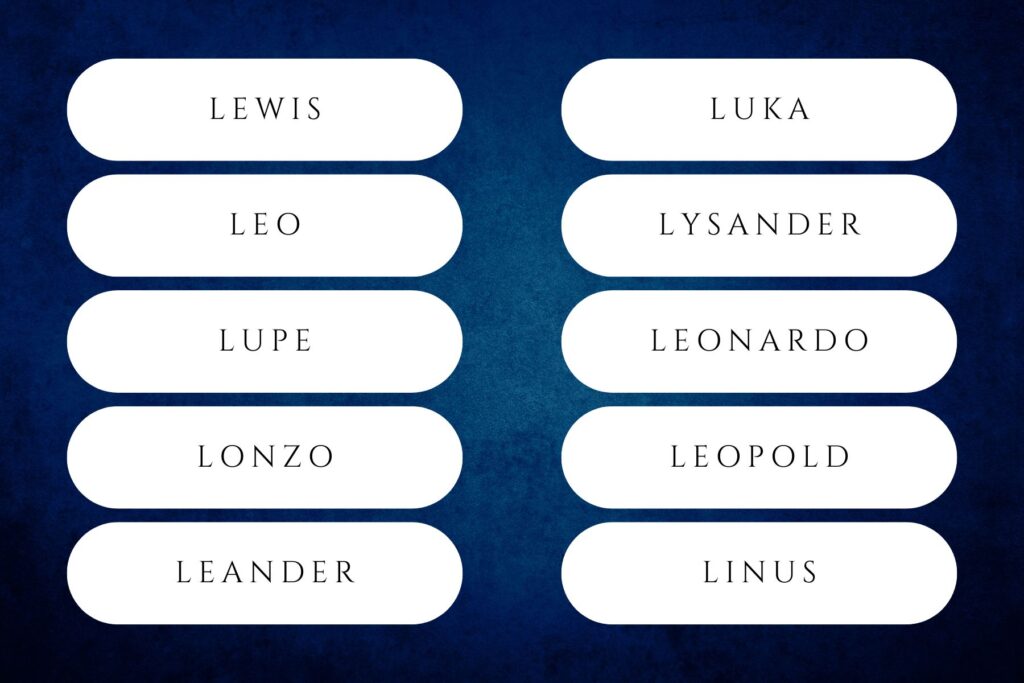
Lewis
Origin: English; Germanic
Meaning: Famous warrior
Lewis, pronounced LOO-is, is the English version of Louis, which comes from the Germanic name Ludwig and is composed of the Germanic elements hlut, meaning "famous," and wig, meaning "war.”
Leo
Origin: Latin; Greek
Meaning: Lion; Zodiac sign; Constellation
Leo, pronounced LEE-oh, comes directly from the Latin word leo, meaning “lion,” ultimately a cognate of the Greek name Leon of the same meaning. Leo is also a constellation and the fifth sign of the zodiac.
Lupe
Origin: Spanish; Arabic
Meaning: Wolf; River; Valley
Lupe, pronounced LOO-pay, most commonly serves as a diminutive of Guadalupe, which comes from a Spanish place name derived from the Arabic element wādī, meaning “valley” or “river,” and the Latin word lupus, meaning “wolf.”
Lonzo
Origin: Roman; Latin; Visigothic
Meaning: From Laurentum; Laurel; Noble and ready
Lonzo, pronounced LON-zoh, is either a diminutive of Laurence, meaning “from Laurentum” in Roman or “laurel” in Latin, or a shortened form of Alonso and Alfonso, meaning “noble and ready” in Visigothic.
Leander
Origin: Greek; Latin
Meaning: Lion man; Lion-like
Leander, pronounced lee-AN-dur, is the Latinized form of the Greek name Leandros, which derives from the Greek elements leon, meaning “lion,” and aner, meaning “man.” In Greek mythology, Leander was known for his love affair with Hero.
Luka
Origin: Greek; Latin
Meaning: From Lucania; From the light
Luka, pronounced LOO-kuh, is a variant of Luca and Lucas in various languages around the world. It derives from the Greek name Loukanos, meaning “from Lucania,” and the Latin word lux, meaning “light.”
Lysander
Origin: Greek; Latin
Meaning: Liberator; One who releases
Lysander, pronounced lye-SAN-dur, is the Latinized form of the Greek name Lysandros, which comes from the Greek elements lysis, meaning “release” or “loosening,” and aner, meaning “man.”
Leonardo
Origin: Spanish; Italian; Germanic
Meaning: Brave lion; Brave like a lion
Leonardo, pronounced lee-oh-NAR-do, is the Italian, Spanish and Portuguese version of Leonard, which ultimately derives from the Germanic elements lewo, meaning “lion,” and hart, meaning “brave.”
Leopold
Origin: Old German; Latin
Meaning: Brave people; Brave lion
Leopold, pronounced LEE-uh-puhld or LEE-oh-puhld, is composed of the Old German elements liut, meaning “people,” and bald, meaning “bold” or “brave.” The first element can also be related to the Latin word leo, meaning “lion.”
Linus
Origin: Greek
Meaning: Flax
Linus, pronounced LYE-nys or LYE-nus, comes from the Greek name Linos, meaning “flax,” the flowering plant known as a nutritional source and textile ingredient. In Greek mythology, Linus was the son of the god Apollo.
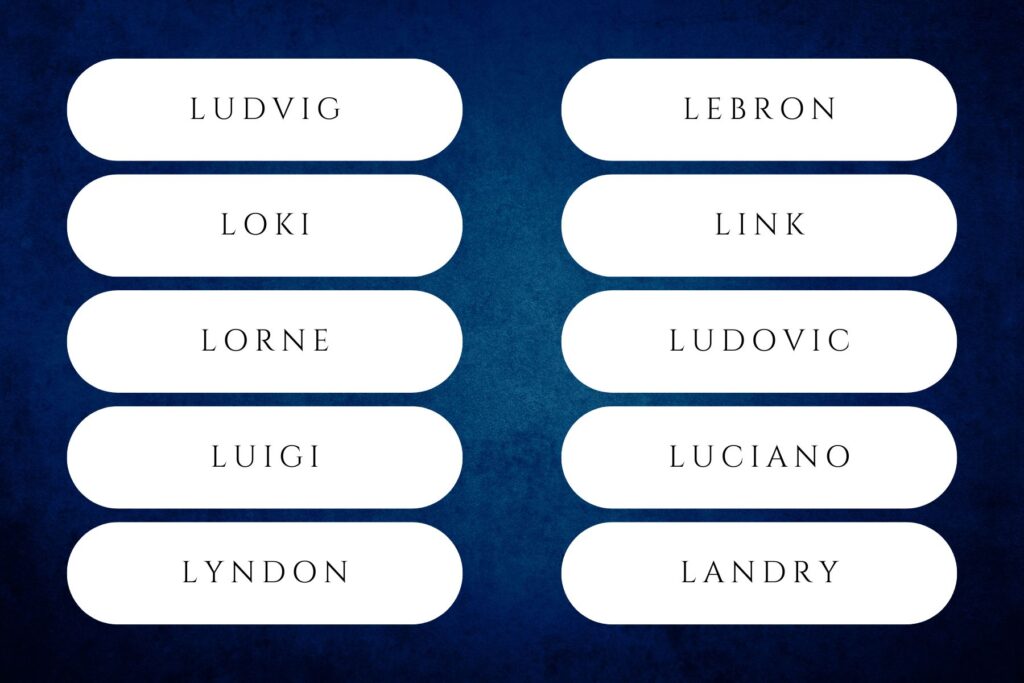
Ludvig
Origin: Old German
Meaning: Famous warrior; Battle-ready
Ludvig, pronounced LOOD-vick or LUHD-vig, is the Scandinavian variant of Ludwig and Hludwig, which is composed of the Old German elements hlut, meaning “famous,” and wig, meaning “battle” or “war.”
Loki
Origin: Old Norse; Germanic
Meaning: Lock; Trickster
Loki, pronounced LO-kee, comes directly from Norse mythology, where Loki was a complex trickster deity associated with magic and shape shifting. The name is believed to derive from the Germanic root luką, meaning “lock.”
Lorne
Origin: Scottish
Meaning: From Lorne
Lorne, pronounced LORN, derives from a region in Argyll, Scotland. The place name may connect to the legendary king Loarn mac Eirc and is often linked to Marquis of Lorne, the name of Canada's 4th Governor General.
Luigi
Origin: Italian; Germanic
Meaning: Famous warrior
Luigi, pronounced loo-WEE-gee, is the Italian form of Louis, which comes from the Germanic name Ludwig, ultimately composed of the Germanic elements hlut, meaning "famous," and wig, meaning "war.”
Lyndon
Origin: Old English
Meaning: Linden tree hill
Lyndon, pronounced LIN-dun or LIN-dyn, comes from an English place name combining the elements for “linden tree” and “hill.” The name gained prominence in the U.S. through President Lyndon B. Johnson.
LeBron
Origin: Invented; French; Spanish
Meaning: The brown one; Hare
LeBron, pronounced luh-BRON, appears to have developed from the French definite article le, meaning “the,” combined with brun, meaning "brown." It can also derive from the Spanish word liebre, meaning “hare.”
Link
Origin: English
Meaning: Joined; Attached; Pool settlement
Link, pronounced LINK, originated as a diminutive of Lincoln, ultimately from Old English elements meaning "pool" and "settlement." It also coincides with the English word link, meaning “joined” or “attached.”
Ludovic
Origin: French; Germanic
Meaning: Famous warrior
Ludovic, pronounced loo-DOH-vik or LOO-duh-vik, is the French form of Ludwig and Hludwig, which is composed of the Old German elements hlut, meaning “famous,” and wig, meaning “battle” or “war.”
Luciano
Origin: Italian; Spanish; Roman; Latin
Meaning: Light
Luciano, pronounced loo-shee-AHN-oh or loo-see-AHN-oh, is the Spanish, Italian and Portuguese form of the Roman family name Lucianus, derived from the Roman given name Lucius and Latin word lux, meaning “light.”
Landry
Origin: French; Germanic
Meaning: Ruler of the land
Landry, pronounced LAN-dree, is the French form of Landric, which is composed of the Germanic elements lant, meaning “land,” and rih, meaning “ruler” or “king.” It entered English usage via Norman French influence.
Lazarus
Origin: Latin; Greek; Hebrew
Meaning: God’s helper, God will help
Lazarus, pronounced LAZ-uh-rus, is the Latinized form of the Greek name Lazaros, which comes from the Hebrew name ʾElʿazar and is composed of the Hebrew elements el, meaning “God,” and azar, meaning “to help.”
What’s the Final Verdict On L Boy Names?

As we've explored these luminous L boy names, it's clear that they offer a wonderful starting point for your baby-naming journey.
From classic choices like Liam and Logan to unique L names for boys like Leif and Lysander, the letter L provides a treasure trove of possibilities for your little one.
But let’s not forget there are 25 other letters of the alphabet worth considering for your son.
When you're ready to continue your naming adventure, Mod Moms Club is here to guide you every step of the way with baby name suggestions and information about where those names come from.
YOU MAY ALSO LIKE: The Ultimate Guide to Traditional Names for Boys
And for personalized suggestions tailored to your preferences, don’t forget about our baby name generator — which may just lead you to the perfect name that makes your heart skip a beat.












